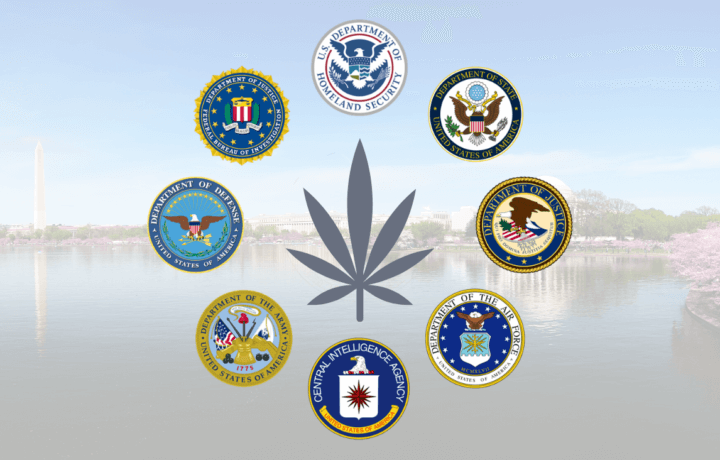By Charles E. Allen
The U.S. Intelligence Community (IC) competes for talent, especially in cutting-edge fields like cybersecurity and engineering in which private employers pay more than government agencies. However, longstanding federal policies prohibiting pre-employment marijuana use make more than 40% of college students ineligible for the security clearances needed to work on national security issues. To enlarge the IC’s recruiting pool, the government should end, or at least ease, inflexible policies on applicants’ use of marijuana; standardize policies across agencies; and work with universities to make students aware of policies before they begin their job searches.
As a 51-year veteran of the Intelligence Community, I do not condone any type of illegal drug use. But intelligence agencies no longer have a monopoly on careers involving cutting-edge technology or exotic international travel, and inflexible policies on pre-employment marijuana use drive talented students to the private sector. If the Intelligence Community wants to attract exceptional young people to serve their country, it must adapt along with American society.
Although marijuana is classified under federal law as a Schedule I illegal drug, evolving social mores and eleven states’ legalization of recreational marijuana use have expanded its use. The U.S. Department of Health and Human Services’ 2018 National Survey on Drug Use and Health reported that 16% of the U.S. population, including 35% of adults aged 18-25, used marijuana within the previous year – a sixteen-year peak. Use of the drug among college students nationwide reached an all-time high in 2018, according to a University of Michigan study, with 43% of college students aged 19-22 using marijuana during the previous twelve months.
Under current policies, all of these students would be disqualified from positions requiring security clearances. Federal adjudicative guidelines on security clearances note that “the illegal use of controlled substances … can raise questions about a person’s reliability and trustworthiness … because it raises questions about a person’s ability or willingness to comply with laws, rules, and regulations.” The guidelines list conditions that could mitigate security concerns – including that drug use was long ago, infrequent, or unlikely to recur – but each agency determines for itself whether an applicant meets these criteria.
This decentralized approach means that policies on pre-employment marijuana use vary. CIA requires applicants to have refrained from illegal drug use for twelve months before applying. The National Reconnaissance Office prohibits drug use for twelve months prior to employment but notes that earlier drug use will be “carefully evaluated,” suggesting that prior use could also be problematic. The FBI disqualifies candidates who have used marijuana within three years preceding their application. Inconsistent practices across agencies confuse applicants, deter students from applying, and make it difficult to know how to modify one’s behavior to remain eligible for a clearance. Since students with critical technical skills have plenty of options in the private sector, rigid policies on marijuana use drive top talent away from government service.
Addressing Marijuana Use for Intelligence Community Applicants
The IC has several options to expand its hiring pipeline. First, it should eliminate the blanket prohibition on pre-employment marijuana use and instead evaluate each candidate individually. Investigators already ask references whether alcohol use affects an applicant’s dependability or performance; similar questions could be asked about marijuana so potentially concerning information can be assessed. Such inquiries would enable clearance adjudicators to distinguish between the heavy marijuana user and the generally rule-following kid who experimented a couple of times. Under such an approach – which is consistent with the government’s “whole person” concept for assessing risk – pre-employment marijuana use would be just one of many behaviors that affect one’s clearance eligibility.
Second, whether or not a decision is made to lift the blanket prohibition, agencies should adopt consistent drug use policies. Once hired, an employee or contractor of one agency will have access to classified information produced by other agencies, so there is no reason to have different standards for granting access to such data. The Director of National Intelligence, as the government’s Security Executive Agent, should work with agencies to develop and implement a uniform government-wide standard on pre-employment marijuana use.
Finally, recruiters from government agencies and companies that do classified work should work with universities to make students aware of drug use policies during their first or second year of school. The process of interviewing and getting a job offer can easily take six months or more, and it takes an additional 4 months (on average) to secure a Top Secret clearance from the Defense Department. (Many intelligence agencies’ investigations, particularly those requiring polygraphs, take far longer.) A requirement to refrain from marijuana use for one year before applying thus means that students must abstain for two years (or more) before graduating. Unless students are made aware of disqualifiers early in their academic careers, many of them may find themselves ineligible to join the IC when they finish school.
As marijuana use becomes more socially acceptable and legal in an increasing number of jurisdictions, federal agencies should change their hiring practices to reflect changing mores – not as an endorsement of marijuana use, but because doing so would enhance the federal workforce. This is fundamentally a true national security imperative; the Intelligence Community must continue to be able to hire the best and the brightest.
The Honorable Charles E. Allen served with the CIA for 47 years, including as Assistant Director of Central Intelligence for Collection. He concluded more than half a century of service in the Intelligence Community as the Department of Homeland Security’s Under Secretary for Intelligence and Analysis and its Chief Intelligence Officer.




